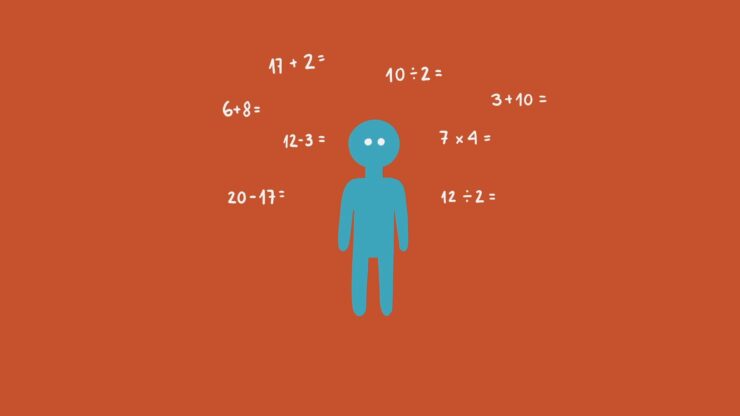Mathematics is a subject that often evokes a range of emotions, from excitement and curiosity to anxiety and fear. Many students find themselves grappling with common fears that can hinder their progress and enjoyment of the subject.
According to The New York Times Magazine, around 30 percent of individuals experience moderate to high levels of math anxiety. It’s a condition that researchers have identified even in children as young as 6 years old. Brain imaging scans have shown that math-anxious children exhibit increased activity in the amygdala, a brain region involved in fear processing.
However, you need to remember that these fears are not insurmountable barriers. With the right mindset, strategies, and support, anyone can overcome their fears of the subject and develop a positive relationship with math.
In this article, we will explore eight smart approaches to conquering common mathematical fears.
1. Recognize and Address Math Phobia

To overcome a fear, it’s important to know what you’re afraid of. When it comes to math, recognizing any negative beliefs or fears you have is a good first step. For example, if you think you’re not good at math or it’s too difficult for you, challenging those thoughts can make you feel less anxious and do better in school or work.
Just realizing there’s a problem is a big step toward overcoming fear. Once we see that our thinking or behavior needs to change, we become more motivated to make positive changes.
2. Build a Strong Foundation
To overcome your fear of math, start by laying a solid groundwork. This involves understanding and mastering the basics, and then practicing them until they become effortless.
Here’s how you can build a strong foundation:
- Read books or materials that explain fundamental math concepts.
- Solve problems using different techniques until you feel confident in your abilities.
- Regularly test yourself with flashcards or online quizzes to reinforce what you’ve learned and prevent forgetting important concepts.
By focusing on the basics and consistently practicing, you’ll gradually strengthen your math skills and gain the confidence needed to tackle more advanced topics.
3. Seek Help and Support
Don’t hesitate to reach out to your teacher, classmates, or tutor for assistance. Collaborating with peers and participating in group study sessions allows you to tackle challenging problems together.
It’s essential to remember that you’re not alone in your struggles, and people are willing to support you. Seeking help will help you gain clarity, learn from others’ perspectives, and build confidence in your mathematical abilities.
4. Utilize Interactive Technology
Using interactive technology like educational websites, math apps, and computer software can make learning math more fun and interesting. Online resources like the Proprep learning platform offer a diverse array of interactive math resources, including video lessons, practice problems, and quizzes.
By using platforms, students can learn math more interactively. It helps them understand concepts better and feel more confident about their math skills. These tools allow students to actively participate in their learning, personalize their study experience, and develop a stronger grasp of math.
5. Master One Concept at a Time

To conquer mathematical fears, it’s important to take things one step at a time. Instead of learning many things at once, focus on mastering one idea before moving on to the next.
Breaking down complex concepts into smaller, easier parts, can help you understand them better and build a strong foundation. This approach boosts your confidence and makes it easier to tackle more difficult math topics. So, remember to take it slow, master one concept at a time, and soon you’ll feel more comfortable and capable in math.
6. Focus on Understanding, Not Just Memorizing
According to Fort Worth Star-Telegram, to improve math test scores, the Fort Worth Independent School District introduced a new math curriculum that aims to enhance students’ understanding of numbers and their practical applications.
At the beginning of the current school year, the district implemented two new math curricula: Eureka Math for elementary schools and Carnegie Learning for middle schools. District officials believe that these new curricula prioritize problem-solving skills and conceptual learning rather than relying heavily on formula memorization. The goal is to provide students with a deeper comprehension of mathematics.
Instead of just memorizing formulas and procedures in math, focus on understanding why those concepts work. When you understand the underlying principles and reasons behind mathematical operations, it becomes easier to solve problems and remember the information.
7. Embrace Mistakes as Learning Opportunities

In math, it’s important to remember that making mistakes is a normal and helpful part of learning. Instead of being afraid of making mistakes, see them as chances to grow and learn.
When you make a mistake, take the time to figure out what went wrong and why. Understanding your mistakes will help you to improve your problem-solving skills. Remember, everyone makes mistakes, and they help you become better at math. So, embrace your mistakes and use them as valuable opportunities to learn and improve.
8. Practice Maths Regularly
According to a report on The Conversation, the belief that certain children are naturally good at math while others are not is incorrect. It all depends on the early exposure and experiences that children have in their lives.
Some parents actively provide more opportunities for their children to engage with numbers at home and in various social and educational settings. These regular exposures make these children seem proficient in math, but it is not because they are inherently skilled. Rather, they have had more time to practice and work with mathematics.
Regular practice is essential for gaining confidence in mathematics. Dedicate consistent time to solving math problems and exercises. This practice reinforces concepts, hones problem-solving skills, and gradually reduces fears.
Conclusion
If you want to overcome your fear of math, it’s important to understand the root cause and address it with the right strategies. You can’t just ignore it or hope that it will go away on its own. You need a plan.
The first step is always recognizing when fear is getting in your way. From there, try some of these ideas for overcoming your mathematical fears so that you can finally start enjoying those dreaded equations.

